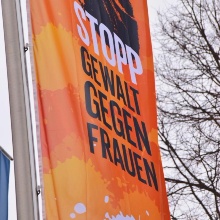The ongoing high-profile rape and abuse trial in Avignon serves as a stark reminder that intimate partner violence and domestic violence are societal issues that can affect anyone, regardless of social status, education level, or living situation – including each of us, as well as our fellow students and colleagues.
Those affected will find support at the University of Stuttgart
Those affected often do not seek help out of shame or it is made more difficult for them. But domestic violence is not a private matter. Those affected carry these experiences with them wherever they go, and it is crucial that they are listened to and supported at all times wherever they are.
Evermood is available as an accessible support resource for students and employees of the University of Stuttgart. Information, advice and support services are offered here – anonymously if required. Last month, articles were added outlining what to do in cases of domestic violence and how to recognize signs of such violence.
Domestic violence is not just an issue that affects the victims; it is a broader societal problem that often involves criminal behavior. Therefore, please do not turn a blind eye if you encounter domestic violence in your surroundings. Seek advice on how you can help those affected and offer your assistance. Anyone can help! A wide range of support is available, including flexible solutions that allow those affected to continue their studies or work despite challenging personal circumstances, thereby alleviating some of the pressure.
Further offers of help
Those affected and people close to them can receive anonymous, confidential, and free advice and support at the following contact points:
- Helpline Violence against Women | Available 24/7 by phone at 08000 116 016 | with online advice accessible through the website, chat, or email | Support is offered in 18 languages, including German sign language.
- Victim support organizations such as WEISSER RING e.V. | by telephone daily from 7 a.m. to 10 p.m. on 116 006 | with online advice accessible through the website, or email | multilingual and in German sign language.
- Women's counseling centers and women's shelters also offer protection and support. They can also help develop a personal safety concept for and with those affected. And offer legal and psychological advice or help you to find a place in a women's shelter. (www.frauenhauskoordinierung.de)
- In case of immediate danger, children can reach out to the children's and young people's helpline "Nummer gegen Kummer" at 116 111. This helpline is open from Monday to Saturday from 2 p.m. to 8 p.m. Further support is provided by regional child protection services, the Child Protection Association and the online advice service for young people at www.youth-life-line.de.
- A free e-learning program offered by the BMFSFJ provides comprehensive, action-oriented knowledge for supporting and caring for victims of violence and their children.
- In the event of an immediate threat, you can always contact the police by dialing the emergency number 110. The police will take all necessary actions to protect you or those affected. For more information, go to https://www.polizei-beratung.de/opferinformationen/haeusliche-gewalt/.
What is domestic violence?
Domestic violence includes all forms of physical, sexual and psychological violence between people living in the same household, regardless of what kind of relationship they have with each other. Domestic violence can be directed against people of any gender and any age. However, women are disproportionately affected by domestic violence, which is why this year's day of action is placing a particular focus on addressing domestic violence against women.
Since 2015, the Federal Criminal Police Department has been publishing an annual report on the state of intimate partner violence. Since 2022, the report has been updated and expanded to include the Domestic Violence Situation . In 2023, a total of 256,276 individuals were victims of domestic violence, reflecting a 6.5% increase compared to the previous year. Of these victims, 70.5% were women, and 525 women lost their lives.
| Contact | Johanna Bernatzky, Breitscheidstraße 2, 70174 Stuttgart, Tel.: +49 711 685 83042, email |
|---|


